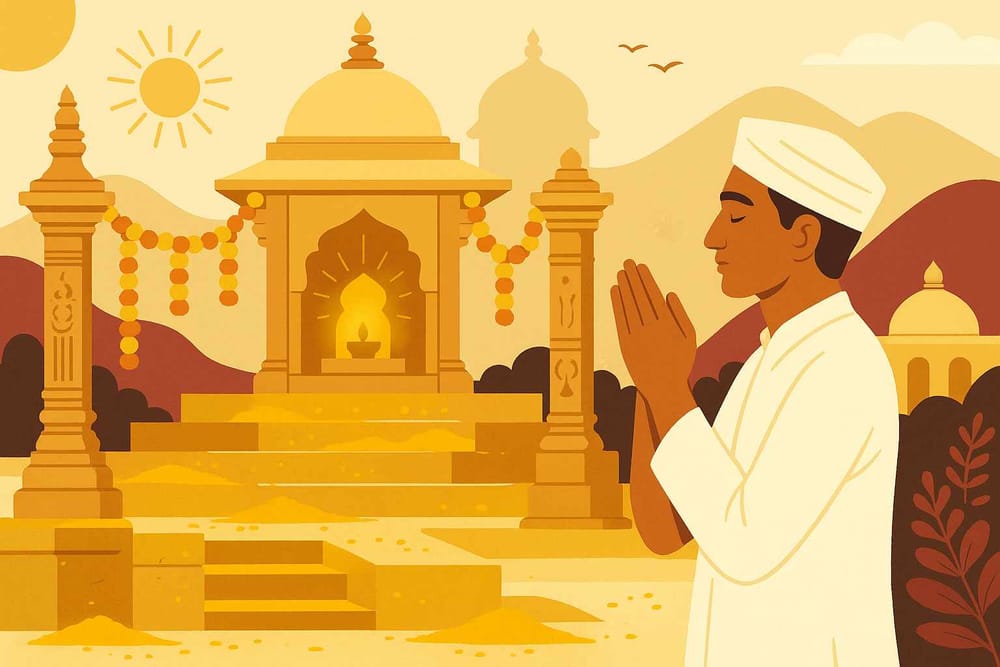
Themes and Imagery in Jejuri- A Poetic Journey Explored
Have you ever been on a journey where you expected to find God, but instead, you found yourself? A journey where the lines between the sacred and the ordinary blurred, and every crumbling stone and faded marigold told a story? That's the feeling Arun Kolatkar’s masterpiece, Jejuri, leaves you with. It’s not just a collection of poems; it’s a quiet, honest conversation about faith in modern India, a trip to a place that feels both ancient and startlingly familiar.
Published in 1976, this collection takes us on a bus ride to the temple town of Jejuri in Maharashtra. But this isn't your typical pilgrimage tale filled with miracles and divine visions. Instead, Kolatkar gives us a ringside view of faith through the eyes of a modern skeptic—someone who sees the dust on the idols, the business in the priest’s eyes, and the sheer, beautiful, chaotic reality of it all.
The Heartbeat of Jejuri: A Town Steeped in History and Belief
To truly appreciate Kolatkar's words, you have to understand the soil they sprang from. Jejuri is no ordinary town. It’s the sacred home of Khandoba, a fierce and beloved folk deity, a warrior god worshipped with immense fervour, especially in rural Maharashtra. He is a protector, a god of the people, whose stories are sung in fields and homes, not just chanted in temples.
This makes Jejuri a fascinating melting pot. Here, ancient folk traditions dance with mainstream Hindu rituals. It’s a place of deep history, where myths feel as real as the basalt rock the temple is built on. Kolatkar, with his sharp, modern eye, steps into this world and shows us its dual nature. He sees the town not just as a holy destination but as a living, breathing place where devotion lives alongside decay, and where deep-seated faith meets the commercial hustle of a pilgrimage site. This blend of the spiritual and the worldly is something we see in so many of our holy cities, isn't it? It reminds me of the vibrant chaos and quiet devotion one might find while exploring Pushkar’s spiritual heart, where every corner has a story.
Exploring the Soul of the Poems: Key Themes in Jejuri
So, what is Kolatkar truly trying to say through these poems? He weaves together several threads of thought and emotion, creating a tapestry that is both deeply personal and universally relatable.
- The Gentle Tussle Between Faith and Skepticism: This is the very core of Jejuri. The narrator is not a cynic who dismisses everything, nor is he a blind believer. He is an observer, one who questions the rituals he sees. He looks at an idol and sees a stone, but he also acknowledges the immense faith that others place in that stone. It’s a conflict many of us feel—a respect for tradition balanced with a need for rational understanding.
- The Beauty in Decay and Impermanence: Kolatkar’s Jejuri is not a pristine, polished temple complex. It’s a place of ruins, dust, and crumbling walls. He finds poetry in this decay, reminding us that nothing is permanent, not even the houses of gods. This theme of transience whispers through the poems, urging us to see the beauty in things that are weathered by time.
- The Sacred and the Profane, Hand in Hand: In Jejuri, a moment of profound prayer can be interrupted by a priest asking for a donation. A divine legend is told by a guide who is simply doing his job. Kolatkar masterfully shows how the sacred and the profane are not separate worlds but are intricately woven together in the fabric of Indian spiritual life. True devotion often thrives amidst the noise and clutter of the everyday world.
- A Quiet Search for Identity: While the journey is to a collective place of worship, the experience is deeply personal. The poet stands as an outsider, trying to find his own place amidst the tide of believers. This subtle exploration of identity—whether we find it in shared traditions or in our own quiet moments of reflection—is a journey we all undertake. It's a personal quest for transformation, much like finding your own spiritual rhythm in a city like Udaipur.
Painting Pictures with Words: The Striking Imagery of Jejuri
Kolatkar’s genius lies in his ability to say so much with so few words. His imagery is simple, direct, and incredibly powerful. He doesn't describe; he shows. Reading his poems feels like looking at a series of sharp, vivid photographs.
You’ll find recurring images that stay with you long after you’ve finished reading. The harsh sun and the long shadows it casts feel symbolic of the constant play between clarity (doubt) and mystery (faith). The crumbling stone pillars and dusty idols are not just objects; they are witnesses to the passage of time. Even something as small as a butterfly or a stray dog wandering through the temple grounds is given a profound significance, grounding the spiritual journey in the real, tangible world.
The colours are stark and memorable—the vibrant yellow of turmeric smeared on stone, the bright orange of marigolds against a backdrop of grey ruins. These contrasts highlight the bursts of life and faith that persist even amidst decay and neglect.
Why Does Jejuri Matter So Much in Indian Literature?
You might wonder why a collection of poems about a small temple town is considered such a landmark. It’s because Jejuri was revolutionary for its time and remains incredibly relevant today. Kolatkar managed to create a work that is authentically Indian, rooted in Marathi culture, yet speaks a universal language of questioning and discovery.
The poem is a gentle critique of the commercialisation of religion, but it never feels preachy. Instead, it invites us to look closer at our own traditions. It shows us that it's okay to have doubts, and that questioning can be its own form of devotion. It bridges the gap between the urban, English-speaking reader and the deep-rooted spirituality of rural India, making us all feel like fellow travellers on this journey of understanding.
At Bhaktilipi, we believe in this very spirit of exploration. Our mission is to preserve and share timeless devotional literature and stories in a way that feels real and accessible. Just as Kolatkar found poetry in the everyday reality of Jejuri, we aim to uncover the divine spark in stories old and new, celebrating our rich heritage for today’s world. If this journey through words resonates with you, you'll find a home in the stories we share.
A Final Thought: The Journey Continues
Arun Kolatkar’s Jejuri is not a destination; it's a journey. It doesn’t offer easy answers about God or faith. Instead, it leaves you with a quiet sense of wonder and a handful of beautiful, honest questions. It reminds us that spirituality isn't always found in grand ceremonies but often in the small, overlooked details—in a crack in a temple wall, in the flight of a butterfly, in the simple act of observing the world with an open heart.
It’s a reminder that faith is a deeply personal path, and sometimes, the most profound pilgrimage is the one we take within ourselves.
About Us
Bhaktilipi brings devotion closer to you by blending timeless tradition with modern interpretations. We carefully curate sacred texts, devotional stories, and poems—available in both original languages and translations. Our goal is to make these treasures accessible to everyone while preserving their authenticity.
We focus on devotional works from different regions and languages, including rare or lesser-known pieces. By digitizing and sharing these resources, we help protect this rich heritage for future generations. Explore themes like bhakti, tradition, and the beauty of devotional imagery on our platform.
Stay connected for updates on new posts, features, and reflections by subscribing to our newsletter. Follow us for more inspiring content:
- Facebook: BhaktilipiOfficial
- Instagram: bhakti_lipi
- YouTube: Bhaktilipi
Join us in celebrating devotion in a way that speaks to today’s readers.
A passionate group of people dedicated to preserving India's knowledge of Dharma, Karma, and Bhakti for ourselves and the world 🙏.
